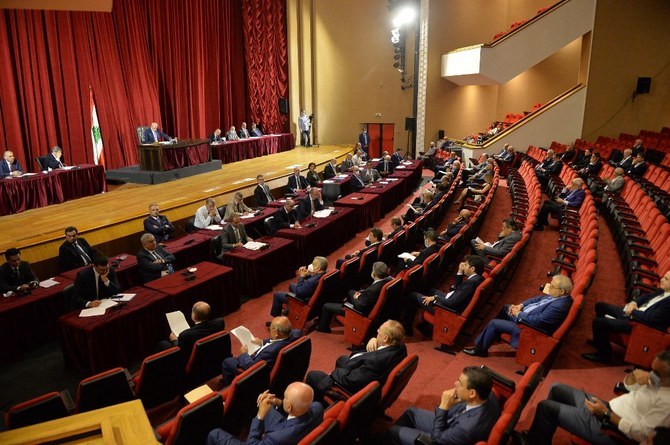
By Jamie Prentis — nationalnews.com — — Chaotic scenes marked the Lebanese Parliament’s first legislative session since the May 15 elections, with MPs given the task of voting on 40 draft laws on Tuesday. Among the items approved include a proposed amendment of Lebanon’s banking secrecy laws and a $150 million loan from the World Bank to support wheat imports for the next six to nine months. Insults were traded on the floor of Parliament, particularly between MPs from Amal — the party of Speaker Nabih Berri — and those from the opposition bloc the Forces of Change, which is linked to the October 2019 protests against the ruling class that led to the collapse of the government.
In one session, Forces of Change MP Cynthia Zarazir was branded a “cockroach” by Amal MP Kabalan Kabalan. ‘Heads held high’ in Lebanon as pride in Cedars basketball team salves Asia Cup loss The amendments to the banking secrecy laws are one of a number of prerequisites for $3 billion in funds from the International Monetary Fund. However, the bill has been watered down from its original version and allows government institutions to lift secrecy specifically in cases of criminal investigations, including in illicit enrichment, money laundering and terrorism financing. But the original draft law would have allowed banking secrecy to be lifted to investigate “all financial crimes”.
Tense scenes could be witnessed outside Parliament as well: family members of the victims of the August 2020 blast that struck Beirut’s port protested in front of the building, demanding that MPs pass a law that would classify the port’s silos as a monument to the more than 200 people who died. “We want [the MPs] to keep the silos as a memorial to the victims that lost their lives,” Mariana Fodoulian, whose 29-year-old sister Gaia died in the blast, told The National.
The 2020 explosion occurred after a large stock of ammonium nitrate, which had been sitting at the port for years, caught fire. “We believe that [the silos] are a collective memory that should be preserved. We should remember the casualties everyday,” Elias Hankach, an MP for the Kataeb Party, told The National outside Parliament.
The Kataeb Party, whose secretary-general Nazar Najarian died in the blast, is behind one of the two draft laws that would classify the silos as a monument. The silos remain a sensitive topic in Lebanon: the explosion has been blamed on mismanagement and corruption, and is viewed as a symptom of the country’s many systemic problems.
In April, the Lebanese Cabinet approved the demolition of the silos after a survey found that they could collapse in the coming months. In addition, a nearly three-week long fire has been burning unchecked at the site, leading to fears it may cave in. But families of the victims filed three separate lawsuits last month to stop the demolition. “Like anywhere in the world, in Hiroshima, in Ground Zero [in New York], in Berlin, we keep a memory of a big catastrophe that happened,” Mr Hankach said.
The demonstrators also protested against the election of the seven MPs who will form the 15-member Supreme Council, which is able to prosecute politicians. The other eight members are judges. An investigation into the port explosion by judge Tarek Bitar has struggled to make headway amid repeated delays. Two sitting MPs in the Lebanese Parliament have been charged in connection with the investigation but have refused to attend interrogation hearings.
Some MPs have suggested the Supreme Council should be the sole body prosecuting politicians charged in connection with the blast — but no MP has ever been tried by the council, despite its decades-long existence. Protesters believe it is an attempt by those accused of responsibility for the blast to evade justice. “It’s been 30 years that we had have this Supreme Council. It’s never working and we never saw anyone in jail,” said Ms Fodoulian. “They are trying to take the investigation from the hands of the judge and take it to the Parliament. This is not acceptable for us. “We need the support of the Lebanese people. We will never forget and we have to punish [those responsible] so that nothing else will happen again.”



